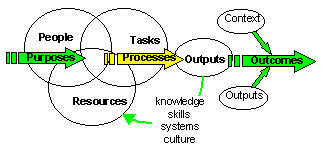![]()
Other topics
Confusion
There is considerable confusion about outcomes. Many of the things that are categorised as outcomes are actually outputs. Outputs are often more specific and tangible and hence more measurable and so they tend to attract our attention.

Outcomes, on the other hand, occur in the lives of the people or enterprise. The fundamental outcomes are success and wellbeing. These are not isolated things like knowledge or skills but rather experiences and potentials.... Outcomes are personal and situational.
Outputs (knowledge, skills, effort, products, services, arrangements...) combine with the circumstances in specific contexts to result in outcomes.
The method for appraising outcomes is usually observation and enquiry. The quality of an outcome is assessed against purposes and expectations.
On the issue of variation we aim for consistency of outcomes which is much more important than uniformity of outputs.
Consider 'midyear reporting' to parents:
The outputs include
- a report document (usually published and distributed)
- updated student records
- various letters and forms (eg, explanations and appointments)
- interviews
- timetables and timelines
- awards and other recognitions
- policies and processes
- changed school plans and teaching practices
- ....
These are usually highly consistent across the reporting system
The desirable outcomes may include
- improved understanding of achievements and future needs and priorities
- better working relationships between all concerned
- renewed commitments to collaboration towards success and well-being for all
- improved school performance in the areas of teaching, pastoral care, communicating with families
- improved attendance and engagement with learning
- ...
A common error in education is to assume a causal link between outputs and outcomes and to 'demonstrate the achievement of outcomes' by the assessment of outputs.
It is much easier to manage and 'regulate' outputs (in a factory sense) than to do the same with outcomes. Outcomes are hugely subject to 'special causes' of variation.
The cost of such an approach is that the focus on outputs expends resources (time, effort...) that do not provide a return proportional to the investment. People in the field are more likely to know where the investment should be made in relation to achieve the best outcomes for each student.
In addition policy often attempts to require specific action that will ensure outputs (even if the outputs already exist), eg, required teaching of spelling lists even when the children can already spell most of the words. Compulsory amounts of time on literacy, 'sustained uninterrupted reading each day in class, and the teaching of phonetics... are other examples.
The outcomes then becomes 'compliance with policy' rather than the outcomes that the policies are intended to achieve. The achievement of outcomes is not mechanical nor linear. See the Policy Trap
This is not to imply that it is a choice between outputs and outcomes, outcome do require outputs!! Focusing on the 'right outputs' requires a judgement about which outputs are critical to the desired outcomes. It is this need for judgement that makes teaching a profession rather than a trade or technical task.
Mediated Learning is the best pedagogy for accommodating the tension, ambiguity and uncertainty between outputs and outcomes. Mediated learning focuses on enabling the learner during the learning process and in everyday situations to achieve the desired outcomes, ie, those that match the purposes of the learning and other endeavours.
![]()